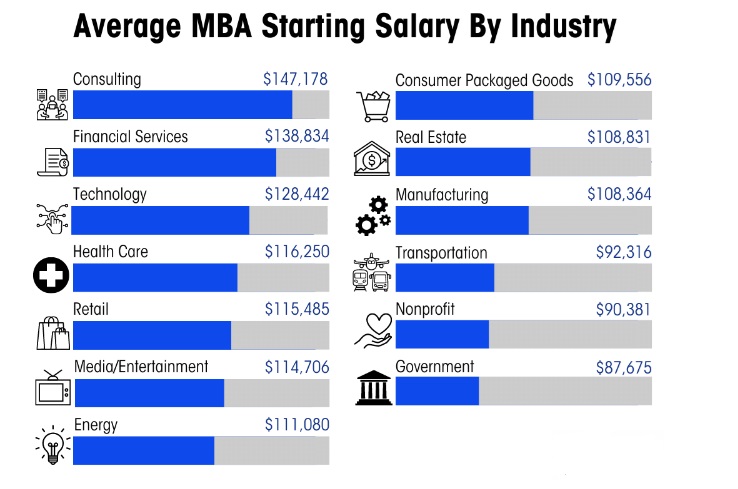So, which degree is better for top executive roles? The answer depends on your career trajectory, current position, and personal goals.
What Is an MBA?
An MBA is designed to equip early- and mid-career professionals with a solid foundation in business. MBA programs generally cover a broad range of topics like finance, marketing, operations, and strategy.
This comprehensive approach provides students with essential business skills and knowledge, making them more competitive in the job market.
MBA programs often attract individuals who are looking to switch careers, start their own business, or move into management roles within their current company.
These programs typically require a significant time commitment—ranging from one to two years full-time—but can also be taken part-time or online.
What Is an EMBA?
The Executive MBA, on the other hand, is tailored for seasoned professionals already holding mid- to senior-level positions. EMBA students often have a decade or more of work experience, with many already occupying management roles.
The program’s structure is designed to fit the busy schedules of working professionals, offering part-time, weekend, or evening classes.
While the core curriculum of an EMBA mirrors that of an MBA, the real value comes from the network of experienced professionals who collaborate on high-level business challenges in the classroom.
Students often bring current work projects into discussions, allowing them to immediately apply what they learn to real-world situations. For those already in leadership roles, an EMBA sharpens existing skills while providing strategic insight into top-level decision-making.
Key Differences MBA and EMBA: Which Is Better for Executives? –
Choosing between an MBA and an EMBA largely depends on your career stage. Here are some of the key differences:
- Experience Level: MBAs are great for those earlier in their careers or looking for a career change, while EMBAs are targeted at experienced professionals seeking to refine leadership skills.
- Class Structure and Flexibility: An EMBA is generally more flexible for working professionals, offering classes outside of standard business hours. MBA programs often require full-time study, though part-time options are available.
- Networking Opportunities: The networking component of both programs is a major draw, but the EMBA typically offers access to a more seasoned, influential peer group—many of whom may already be in executive positions.
- Immediate Application: EMBA students frequently apply lessons from the classroom to their current jobs, offering a more immediate return on investment.
Cost Considerations
Both programs can be costly, but the EMBA is usually more expensive due to the advanced level of education and the assumption that students are already earning higher salaries.
However, many companies are willing to sponsor high-potential employees in EMBA programs, viewing it as an investment in leadership development.
An MBA, while still expensive, may come with more scholarships and financial aid options, especially for younger students just starting their careers. Regardless of which program you choose, both can significantly increase earning potential and open doors to executive roles.
Salary (Wage) Increases From MBA vs EMBA
The Australian Financial Review’s 2019 BOSS MBA Ranking revealed that both MBA and EMBA graduates in Australia enjoy substantial post-graduation salary boosts.
According to the report, MBA graduates saw a 28% salary increase, with their average earnings rising to $157,000. EMBA graduates, however, saw an even greater leap, with a 44% pay hike, bringing their average salary to $222,000.
Although MBA and EMBA programs cater to different candidates, with variations in work experience, entry requirements, and course delivery, both degrees remain highly respected and valued in the business world.
Melbourne Business School has risen to 73rd place in the latest global Executive MBA rankings by the UK-based Financial Times, up from 94th in 2022. Graduates of the program reported an impressive 50% salary increase after completing their studies.
In 2024, the MBS EMBA will cost $119,700, with graduates earning an average salary of $US176,309 ($277,300) three years post-graduation from the 18-month residential program marking a significant increase from the previous year’s reported salary of $US163,876.
MBA Employment Outcomes
The flexibility of an MBA allows graduates to pursue a wide range of career paths, opening doors to various industries with promising opportunities.
It can impact several aspects of a graduate’s life, from salary potential to career advancement, and help determine which industries are the best fit for maximizing the value of their degree.
MBA graduates continue to see significant increases in total compensation, with a median rise of 29% in 2022 for those already employed in the industry.
Full-time MBA graduates experienced the highest growth at 60%, followed by professional MBAs at 38%, and business master’s graduates at 29%.
However, the data also highlights a persistent gender pay gap in the MBA field. On average, male MBA graduates earn 20% more than their female counterparts across industries.
For women with 0-2 years of experience, the average salary stands at $133,511, while men in the same experience range earn $144,956. The gap widens with experience, as women with over nine years in the field earn an average of $179,159, compared to $241,607 for men

Which Degree Will Serve You Best?
If you’re at an earlier stage in your career, aiming to build a strong business foundation, and possibly looking to change industries, an MBA might be the better choice. It offers the comprehensive education and flexibility you need to shape your career direction.
However, if you’re already established in your career and aiming for higher executive roles, the EMBA provides the strategic insights, leadership skills, and powerful network that can catapult you to the next level.
The ability to work while studying means you won’t lose momentum in your current role, and the immediate applicability of the lessons learned makes it a more practical choice for those aiming for top executive positions.
In the end, the choice between an MBA and an EMBA comes down to your career goals and the stage of your professional journey.
Both degrees hold significant weight in the business world, but the path to the C-suite could depend on making the right choice based on your personal and professional needs.







